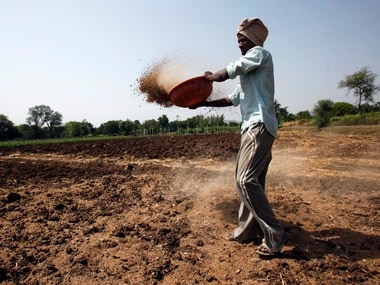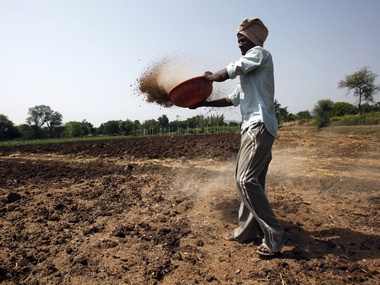The new year has brought bad tidings for India’s farming community. Twelve farmers committed suicide due to crop failure in the Vidharba region of Maharashtra in just one week after 22 December. This spate of suicide by farmers provoked a frustrated BJP Lok Sabha MP from the Vidharba region to say, “Let the farmers die. If they can’t survive in farming, let them die”. This rather insensitive remark by Member of Parliament, Sanjay Dhotre, was played on some national TV channels repeatedly. Dhotre later said he was merely expressing a sense of helplessness while making those remarks. Well, helplessness is likely to become a permanent state of mind among the farming community as global agriculture commodity prices have fallen by upto 30% in the past few months and local farmers are not likely to get higher prices for their domestic produce. The increase in Minimum Support Price(MSP) for farmers under the Narendra Modi government has been much less than what was given in the past many years. This is inspite of Modi’s explicit promise to farmers during his election campaign that they would get 50% profit margin over their cost of production. This promise has remained unfulfilled so far. And all this is happening at a time when there is growing distress among the farming community due to falling global agriculture prices. [caption id=“attachment_1989685” align=“alignleft” width=“380”]
 Reuters[/caption] Last fortnight, countrywide survey conducted by the National Sample Survey Organisation(NSSO) revealed that nearly 50% of India’s 90 million farm households were indebted to either banks or money lenders. Uttar Pradesh had the highest number of indebted farm households at 69 lakhs. Andhra Pradesh was the second largest with 49 lakh familes in debt and Maharashtra had 36 lakh farm families which had taken loans mostly for their farm business. Over 50% of the loans were meant for capital and other expenditure on the farm. The NDA’s first full budget will have to pay some serious attention to what is happening in India’s farm sector. Normally the budget exercise is dominated by the concerns of the industrial sector which enjoys disproportionate clout and talk time with the government through high profile industry associations. Anyone who follows the government’s budget-related interactions with the public knows that industry, particularly big businesses dominate the exercise. Agriculture gets some time, but it is more routine in nature. This time agriculture needs to be taken more seriously as it also drives rural demand for goods and services. Of course, Finance Minister Arun Jaitely has to look at the problems confronting the overall economy, which are no less serious. The uptick in sentiment and confidence that was reflected after the Modi government came to power seems to be waning as some economic indicators clearly challenge the narrative of a quick recovery in the economy. The virtual collapse of global oil prices is now causing fears of volatility in global finance capital movement which will also affect India. Crude at $50 dollar a barrel is not good for the United States which is staging an impressive economic recovery largely on the back of massive shale gas/oil production. So India cannot be an island of growth in a world economy buffeted by volatility. For India, particularly worrisome is the data showing virtually no pick up in industrial growth so far in 2014-15. Ongoing investment projects totalling Rs.6.3 lakh crore are not moving forward for various reasons. Infrastructure projects, particularly in the road sector, are not moving because private companies building them are either strapped for cash or engaged in disputes relating to execution with the government. The Chief Economic Advisor in finance ministry Arvind Subramanium has publicly admitted that infrastructure companies are facing a huge debt problem in their balance sheets. Banks are not giving them more money to implement projects. As a result the National Highway Authority of India(NHAI) has decided that government will fund 70% of all new highway projects in the next two years. Finance Minister Arun Jaitley had said the increase in excise duties in recent weeks are aimed at funding road projects. In non-infrastructure sectors we are faced with over capacity due to demand contraction. Industry is currently running at 70 per cent of its existing production capacity. This means new investments will not happen unless consumer demand picks up and fuller utlilization of capacity happens. This could get difficult in the coming year because rural demand, which is critical, could further contract as global food prices have dropped by 20 to 30 per cent. The farmers’ income growth may decelerate in 2015. Nominal rural wages grew handsomely by 17 to 19 percent for a few years until 2012 end. But now rural wage growth is negative after adjusting for inflation. Experts also anticipate output slow down in the agriculture sector which consistently recorded good growth in recent years. Agriculture growth may slip badly 2015 going by current trend. Modi is particularly vulnerable because he had made tall promises to the farmers during his election campaign. He will soon be tested against his big commitments made to farmers. In short, many political economy challenges lie ahead for Narendra Modi and Arun Jaitley.
Reuters[/caption] Last fortnight, countrywide survey conducted by the National Sample Survey Organisation(NSSO) revealed that nearly 50% of India’s 90 million farm households were indebted to either banks or money lenders. Uttar Pradesh had the highest number of indebted farm households at 69 lakhs. Andhra Pradesh was the second largest with 49 lakh familes in debt and Maharashtra had 36 lakh farm families which had taken loans mostly for their farm business. Over 50% of the loans were meant for capital and other expenditure on the farm. The NDA’s first full budget will have to pay some serious attention to what is happening in India’s farm sector. Normally the budget exercise is dominated by the concerns of the industrial sector which enjoys disproportionate clout and talk time with the government through high profile industry associations. Anyone who follows the government’s budget-related interactions with the public knows that industry, particularly big businesses dominate the exercise. Agriculture gets some time, but it is more routine in nature. This time agriculture needs to be taken more seriously as it also drives rural demand for goods and services. Of course, Finance Minister Arun Jaitely has to look at the problems confronting the overall economy, which are no less serious. The uptick in sentiment and confidence that was reflected after the Modi government came to power seems to be waning as some economic indicators clearly challenge the narrative of a quick recovery in the economy. The virtual collapse of global oil prices is now causing fears of volatility in global finance capital movement which will also affect India. Crude at $50 dollar a barrel is not good for the United States which is staging an impressive economic recovery largely on the back of massive shale gas/oil production. So India cannot be an island of growth in a world economy buffeted by volatility. For India, particularly worrisome is the data showing virtually no pick up in industrial growth so far in 2014-15. Ongoing investment projects totalling Rs.6.3 lakh crore are not moving forward for various reasons. Infrastructure projects, particularly in the road sector, are not moving because private companies building them are either strapped for cash or engaged in disputes relating to execution with the government. The Chief Economic Advisor in finance ministry Arvind Subramanium has publicly admitted that infrastructure companies are facing a huge debt problem in their balance sheets. Banks are not giving them more money to implement projects. As a result the National Highway Authority of India(NHAI) has decided that government will fund 70% of all new highway projects in the next two years. Finance Minister Arun Jaitley had said the increase in excise duties in recent weeks are aimed at funding road projects. In non-infrastructure sectors we are faced with over capacity due to demand contraction. Industry is currently running at 70 per cent of its existing production capacity. This means new investments will not happen unless consumer demand picks up and fuller utlilization of capacity happens. This could get difficult in the coming year because rural demand, which is critical, could further contract as global food prices have dropped by 20 to 30 per cent. The farmers’ income growth may decelerate in 2015. Nominal rural wages grew handsomely by 17 to 19 percent for a few years until 2012 end. But now rural wage growth is negative after adjusting for inflation. Experts also anticipate output slow down in the agriculture sector which consistently recorded good growth in recent years. Agriculture growth may slip badly 2015 going by current trend. Modi is particularly vulnerable because he had made tall promises to the farmers during his election campaign. He will soon be tested against his big commitments made to farmers. In short, many political economy challenges lie ahead for Narendra Modi and Arun Jaitley.
50% of farmers indebted: Modi needs to shift attention to distress in farm economy
M K Venu
• January 12, 2015, 12:39:45 IST
Modi is particularly vulnerable because he had made tall promises to the farmers during his election campaign. He will soon be tested against his big commitments made to farmers.
Advertisement
)
End of Article